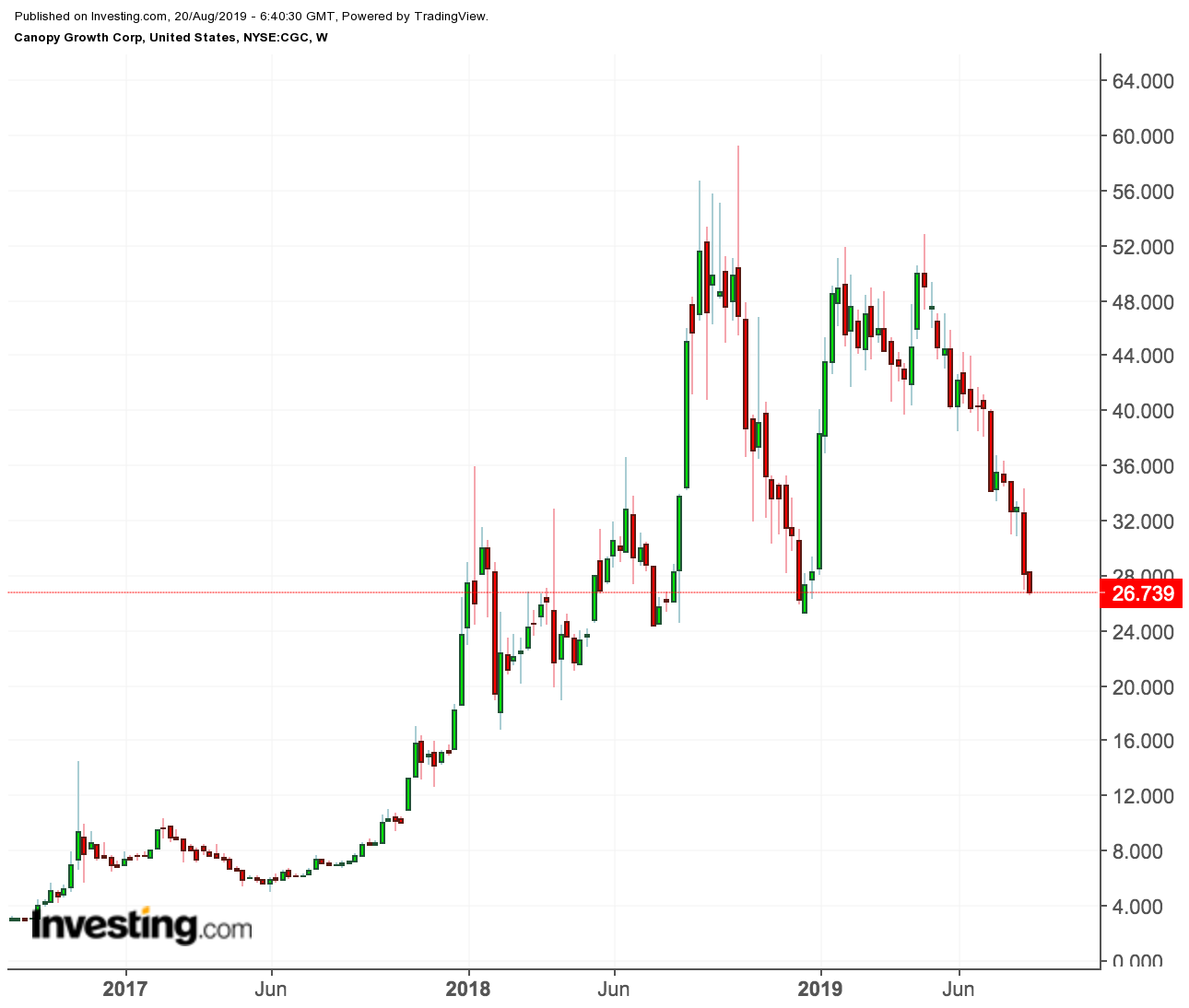Shares of the world’s largest cannabis company hit their lowest point in 2019 yesterday. The price of Canopy Growth Corp (NYSE:CGC), (TSX:WEED) stock closed at US$26.72 (C$35.66), marking a 4.94% drop on the day and a 48.6% slide since the end of April, when it hit US$52.03 (C$69.90).
The stock registered its all-time highest in October 2018, when marijuana was legalized in Canada, trading at US$56.89 (C$73.75). In the last 12 months, it has lost 16.74%.
In the first few months of 2019, from January to late April, the stock price – like others in the cannabis sector – was driven by continued optimism. But that buoyancy was difficult to maintain in the face of indisputable numbers.
Worse-than-expected earnings results not only took a toll on Canopy Growth stock, they caught up with other players in the sector. Investors, who were once fuelled by the prospect of great things to come, got impatient – and that included corporate investors who entered the space as strategic investors with deep pockets.

So Where Does Canopy Go From Here?
The answer is still not clear, but indicators are out there.
Last week’s earnings report was a major one. The Ontario-based cannabis grower reported a net loss of C$1.28 billion (US$0.96 billion) in its first quarter of fiscal 2020. This was up from a loss of C$91 million (US$68.3 million) in the same period in fiscal 2019. It had an increase in revenue, but it did not stack up against the 215% spike in operating costs.
Net revenues were pegged at C$90.5 million (US$67.9 million), compared with C$25.9 million (US$19.4 million) in the same period the previous year. The healthy increase in revenues was attributed to the company’s largest harvest to date – 40,000 kilograms.
Despite some positive indicators, the bottom line was that both the reported loss and revenue figures were worse than analysts had anticipated. This sent share prices from US$31.93 (C$42.46) at the close on Aug. 14 just before the earnings report was released to US$27.34 (C$36.38) at the close the following day, a drop of 14.38%. The stock rallied somewhat in the latter half of last week, but resumed its downward trajectory yesterday.
Former CEO Buying Up Stock
Countering the negative impact of the earnings numbers were reports of what the company’s high-profile former CEO was up to. Bruce Linton, who was fired in June after Canopy’s strategic partner, Constellation Brands (NYSE:STZ), issued a public thumbs-down on the company’s performance following the previous earnings report, is buying stock.
Linton, who founded Canopy in 2013 and built it into the biggest cannabis producer on the globe, is still very keen on the company. After the stock fell in the wake of the latest earnings, he revealed in an interview that he has been “watching the dips” and has bought shares. He did not disclose how much he bought, but said he took advantage of what he referred to as the “August sale.”
Here’s Something To Chew On
As investors look toward the next developments in the overall cannabis market — the introduction of a slew of consumer products such as beverages and edibles, Canopy Growth says it's preparing rapidly for the wave of legalizations. The company announced during its earnings presentation that it's filed 56 patents in the last three months alone for new products. CEO Mark Zekulin said these high-margin, unique cannabis consumer products, including vapes, food products and drinks, have the greatest potential of expanding the Canadian market for recreational cannabis products for the company.
And indeed, according to a new survey, an estimated 3 million customers are expected to enter the Canadian cannabis market when edibles, extracts and topicals are legalized later this year.
That is the major finding of a survey published last week by EY Canada and Lift & Co.
And given that Canada is leading the legalization push, what happens there provides a benchmark that other potential markets that are considering legalization are watching.
“New product offerings will open the doors for experimentation among current and non-consumers giving cannabis companies the opportunity to capture a larger market share,” said Monica Chadha of EY Canada Cannabis. “But companies should keep in mind that these consumer segments will have very different attitudes towards cannabis and product formats, ultimately driving the need for differentiated customer experiences.”
Only 17% of Canadian adults are cannabis consumers at the moment, according to Statistic Canada.
Current non-consumers place more emphasis on clinical research and information to make purchasing decisions, according to the survey. The report claims a third of non-consumers surveyed said they did not know enough about cannabis to consume it, but were interested in experimenting with low-dosage baked goods, confectionery and food additive products.
These products will be in retail outlets in Canada by mid-December.
